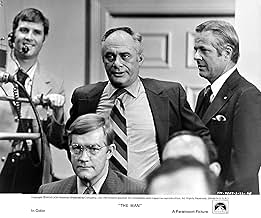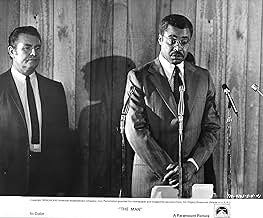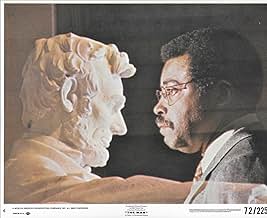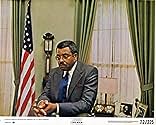African American senator Douglas Dillman becomes designated survivor of a tragic accident that kills the U. S. President. Eventually, Dillman becomes the first black U. S. President and atte... Read allAfrican American senator Douglas Dillman becomes designated survivor of a tragic accident that kills the U. S. President. Eventually, Dillman becomes the first black U. S. President and attempts to end the bigotry standing in his way.African American senator Douglas Dillman becomes designated survivor of a tragic accident that kills the U. S. President. Eventually, Dillman becomes the first black U. S. President and attempts to end the bigotry standing in his way.
- Awards
- 1 nomination total
- Wheeler's Lawyer
- (as Martin Brooks)
Featured reviews
Enter US Senator Douglass Dillman, who is president pro tempe of the senate. He is also black. He accepts the presidency to the discontent of many cabinet officials, especially the secretary of state. He would be president if not for Dillman.
Racial feelings are revealed among several politicians as Dillman sits in the oval office, determined to overcome the bigotry of those around him and to be as good a president as he can be.
An early vehicle for James Earl Jones, who as Dillman, is brilliant. Excellent performances by the supporting cast. Hopefully, this film will one day be on DVD or VHS. It's also a good potential historical lesson to be absorbed by Americans if this situation should ever happen.
Also, there is no assassination plot against the President in the movie.
As for the movie itself, despite the fact that it is penned by Rod Serling (from Irving Wallace's novel), it is remarkably less free of the kind of pretentious liberalism that marred his script for "Seven Days In May." In fact, what is remarkable for the film is how it falls much closer to the center of the spectrum politically in comparison to what Hollywood churns out today like "West Wing".
Jerry Goldsmith's score is the best work he ever did for a TV-movie and hopefully some day it will find its way to CD as many other obscure TV scores of his have.
When the POTUS, the Speaker of the House, and others are killed in a very unfortunate accident, and the VP declines being sworn in due to his health, the next in line for the presidency became Senator Douglas Dilman (James Earl Jones). The initial thought was that the Secretary of State would be the next in line, but due to the Succession Act of 1947 the hierarchy was the President, Vice President, Speaker of the House, then President Pro Tempore of the Senate. This thrust a Black man into the presidency for the first time in U.S. history.
Naturally, the implications, expectations, and non-expectations were tremendous. This movie could've gone in almost any direction and that's what we were waiting for as viewers: to see what direction it would go.
The plot thickened as did the agendas once Dilman was sworn in. I think we only got a small taste of both the positive and negative expectations placed upon Dilman by Blacks and Whites. The movie settled in on one hot button issue surrounding the apartheid country of South Africa. It was an intricate hot mess President Dilman had to deal with. He was in a most unenviable position and I think the film (and Jones) conveyed that well.
This was a bold and brave movie for 1972. The dialogue was excellent as was the script. I only wonder if Obama ever watched this?
The Presidency falls to a surprizing fourth in line.
It's a great story and I don't understand why it isn't on video yet.
The only small flaw is that it is time dated with the premise of Apartied in South Africa. Everyone write to the studio and get them to put it out on video. It has appeared on TV but they cut it to ribbons and destroy the continuity. -ARBY
Did you know
- TriviaJames Earl Jones was interviewed about portraying a fictional black U.S. president a few days before Barack Obama was sworn in as President. Jones said that he had misgivings about the film, mostly because they were blindsided when the project (which was planned and budgeted as a TV movie) was released in theaters, and he wished that they'd had more time and resources to make a stronger final film.
- Quotes
Douglass Dilman: We live in a time when violence is offered up as the panacea. The bullet seems to be the final instrument of political discourse. Men die violently, we bury them, we mourn for them and we seek retribution. It's a deadly pattern... a quote from Genesis: "Behold the dreamer. Come now therefore and let us slay him and we shall see what has become of his dream." We cannot murder the tyranny by murdering the tyrant and we cannot murder the dream by murdering the dreamer. And if we justify the taking of any life in the name of our morality, we've done nothing but murder our morality.
- ConnectionsFeatured in The Dick Cavett Show: Episode dated 19 July 1972 (1972)
- How long is The Man?Powered by Alexa
Details
- Release date
- Country of origin
- Language
- Also known as
- The Man
- Filming locations
- Production companies
- See more company credits at IMDbPro


























